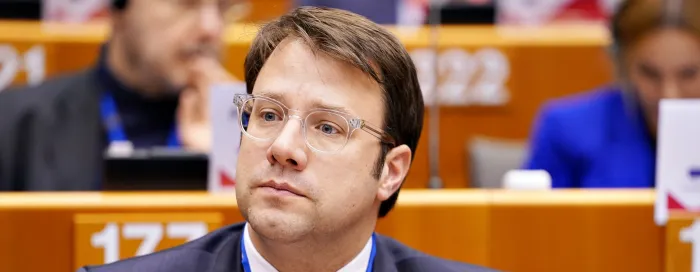Since 1 January 2021, the UK has no longer been part of the European Union's single market and customs union. The EU and the UK have opened a new chapter in their relations, based on a Trade and Cooperation Agreement. The consequences of Brexit on cities and regions and their communities can be felt all over Europe, and progressive local and regional politicians are doing their part to maintain strong ties with the UK's cities and regions. We spoke to our member Loïg Chesnais-Girard, president of the region of Brittany, France, whose geographical, economic, cultural and human ties with the United Kingdom are particularly strong.
At the start of this new year, with Brexit becoming definitive, a new page is turning for local and regional authorities. What is the greatest impact on cities and regions on the two sides of the Channel? Do you see a new chapter starting for relations between British and European local and regional authorities?
Of course, the impact is primarily economic, with some sectors hit harder than others, such as fisheries. It also affects scientific and academic cooperation. But it is mostly traumatic in cultural terms. Our links with the UK’s cities and regions are strong and historical, but they will inevitably be weakened by Brexit. I must say, however, that the shock is even greater for our British partners. They are fully aware of all the benefits they received from the EU. I think there is a willingness to find new ways of cooperation. In that sense, yes, a new chapter will start. We will have to be inventive, but the desire is there.
Your region, Brittany, is particularly exposed to the effects of Brexit, especially in the fisheries sector. How will you support businesses and jobs? Do you think that the Brexit adjustment reserve could cause an economic downturn in Brittany?
Fortunately, we did not wait for Brexit before anticipating its consequences. Like other regions, we have been working for two years to prepare businesses that are not used to exporting outside the EU. As with any upheaval, Brexit presents risks but also opportunities. The Brittany region will be able to help address this issue, in particular through its role in vocational training. I have high expectations for the adjustment reserve. This is a time when the Union has to show that it protects its citizens and regions. But I am afraid that, at EU level, the amount of EUR 5 billion will be insufficient and will result in resources being spread too thinly. I am of the opinion that this reserve will need to be targeted in order to be truly effective.
Brittany has forged very close human ties with its neighbours across the Channel, particularly cultural ones. What will the impact of the UK abandoning the Erasmus+ programme be in Brittany? Are you thinking about other forms of cooperation to maintain links between future generations?
The UK’s abandonment of Erasmus+ is a disaster. I find it difficult to understand how diminishing the prospects of its youth people can be a good thing. In Brittany, the UK was the first destination for our young people in Erasmus. But I am not giving up. We already enjoy very active academic cooperation with Wales. I think that the regions can offer alternatives. They will not, of course, be able to replace Erasmus, but perhaps they can mitigate the consequences of this decision so that our young people can continue to take part in exchanges.
Le #BREXIT restera une mauvaise nouvelle mais cet accord préserve la pêche, activité majeure de la Bretagne. Le 2 janvier nos marins-pêcheurs ne resteront pas à quai. Maintenant il faut analyser précisément les impacts de cet accord, pour l'économie et pour nos vies quotidiennes. https://t.co/dtu3lQyrCW
— Loïg Chesnais-Girard (@LoigCG) December 24, 2020
At the European Committee of the Regions, you chair the contact group responsible for maintaining links between local and regional authorities in the 27 European Union Member States and the United Kingdom. What will its priorities be for this year?
I am pleasantly surprised by the appetite generated by this contact group. Our British partners are very active and are willing to step up work with us. I believe that the regions can play a key role in maintaining links that States may find harder to maintain, at least for a few years. We can help preserve the future because I do not see the future of Europe without a close partnership with the UK in one form or another. I think that our work this year will have to start by focusing on a few concrete topics, as we will not be able to do everything at once. I think that the issue of youth mobility would be a good one to start with, if our British friends agree.
The CoR-UK Contact Group discussed in its meeting yesterday how to maintain good lines of communication beyond 2020.
— European Committee of the Regions (@EU_CoR) November 17, 2020
Read the full press release here: https://t.co/yPbAYwf86u @LoigCG @PES_CoR pic.twitter.com/6MX4D7E63l
***
Loïg Chesnais-Girard is chairman of the European Committee of the Regions-UK Contact Group. The other PES Group members of the Contact Group are: Ximo Puig i Ferrer, president of the Valencia region, Spain; Antje Grotheer, vice-president of Bremen City Parliament, Germany; and Isilda Gomes, mayor of Portimão, Portugal.
Copyright of the header photo: Thomas Crabot –Région Bretagne
